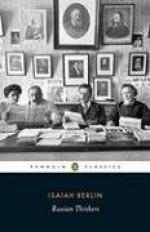
|
| Name: _________________________ | Period: ___________________ |
This test consists of 15 multiple choice questions and 5 short answer questions.
Multiple Choice Questions
1. Which figure was prominent in the founding of the Russian Intelligentsia?
(a) Fyodor Dostoevsky.
(b) Ivan Turgenev.
(c) Alexander Pushkin.
(d) Leo Tolstoy.
2. Who spread German Romantic philosophy in student circles?
(a) Nikolai Gogol.
(b) Nicholas Stankevich.
(c) Vissarion Belinksy.
(d) Pavel Annenkov.
3. How does Berlin describe progressive Romanticism?
(a) Progressive Romantics believed that intellectuals were responsible for the soul of the nation.
(b) Progressive Romantics believed that society was inevitably moving forward.
(c) Progressive Romantics believed that progress was going to come from industry and social reforms.
(d) Progressive Romantics believed that serfs would free themselves through violence.
4. Whose novels did the Russian Intelligentsia influence?
(a) Pushkin.
(b) Goncharov.
(c) Turgenev.
(d) Herzen.
5. What did Tolstoy believe was the only way to access truth and reason?
(a) Spiritual transcendence.
(b) Historical awareness.
(c) Transcendental experience.
(d) Human experience.
6. What was the dominant philosophical movement of the second quarter of the nineteenth century in Russia?
(a) American Transcendentalism.
(b) English Humanism.
(c) German Romanticism.
(d) American Pragmatism.
7. How did the epoch that followed the Tsar's acts in the wake of the Decembrist Rebellions end?
(a) With the German invasion of 1848.
(b) With Tsar's conversion in 1845.
(c) With the Tsar's death in 1855.
(d) With the Tsar's overthrow in 1850.
8. How does Berlin describe Bakunin's personality?
(a) As magnetic.
(b) As polarizing.
(c) As shy and shrinking.
(d) As luminous.
9. Who wrote the memoir titled "The Birth of the Russian Intelligentsia"?
(a) Ivan Turgenev.
(b) Vissarion Belinksy.
(c) Pavel Annenkov.
(d) Alexander Herzen.
10. What had been the outcome of the European states' revolution?
(a) The revolution failed.
(b) Napoleonic wars.
(c) The Thirty-Years' War.
(d) A new era of peace.
11. What does Berlin say Tolstoy felt guilty about?
(a) Having too much insight as an artist.
(b) Having too much wealth as a landowner.
(c) Being too separate from the lives of the peasants.
(d) Not having an overarching vision.
12. What do hedgehogs represent in the adage that "the fox knows many things, but the hedgehog knows one big thing"?
(a) Society.
(b) The concreteness of experience.
(c) Political calculations.
(d) Abstractions.
13. What effect did German Romanticism have on Russian students?
(a) It made them dissolute and morally bankrupt.
(b) It made them resentful of the social distinctions they inherited with their culture.
(c) It made them hungry for violent rebellion and abrupt social change.
(d) It demanded a commitment to social and national causes.
14. Whose work did Bakunin expound paragraph by paragraph?
(a) Dostoevsky's.
(b) Schelling's.
(c) Hegel's.
(d) Herzen's.
15. Where did the term "intelligentsia" come from?
(a) It had always been a role in Russian society.
(b) The Tsar had used it to demean effete thinkers.
(c) It was invented in the mid-1800s.
(d) It was coined by the press during the Dreyfus Affair.
Short Answer Questions
1. Which thinker affected Herzen?
2. What movement was responsible for bringing politics into literature in mid-nineteenth-century Russian literature?
3. What features of European culture were missing in Russia in the 1830s and 40s?
4. What conspiracy against the Tsar did the censorship program discover?
5. What student of Stankevich's lectured on Western medieval history in Moscow?
|
This section contains 494 words (approx. 2 pages at 300 words per page) |

|




